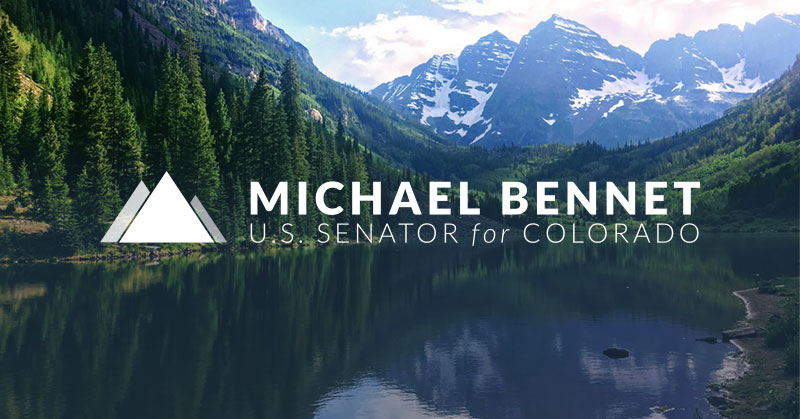Source: United States Senator for Colorado Michael Bennet
Washington, D.C. – Today, U.S. Senators Michael Bennet (D-Colo.), Martin Heinrich (D-N.M.), John Hickenlooper (D-Colo.), and Elizabeth Warren (D-Mass.) applauded funding in the Infrastructure Investment and Jobs Act (IIJA) that will improve Tribal access to clean water. The provisions in the IIJA largely mirror the Tribal Access to Clean Water Act introduced by the senators last month.
“Access to clean water is a fundamental human right, but the reality is that many Tribal communities and Alaska Native villages currently lack access to it,” said Bennet. “I’m thrilled the bipartisan infrastructure bill draws heavily on our Tribal Access to Clean Water Act. This is the first step of many to reduce this shameful disparity and help ensure that Tribal communities have access to safe, clean water.”
“In New Mexico, we know that water is life. And when communities don’t have access to clean drinking water — especially during a pandemic — they suffer,” said Heinrich. “That’s unacceptable, and it’s about to change. We are going to follow through on the federal government’s responsibility to sovereign Tribal nations and make meaningful investments in water infrastructure projects that will finally deliver clean water to all families in Indian Country.”
“Too many Tribal communities lack access to clean water, something every community must have. This much-needed investment will bring improved water infrastructure to Native Americans across the country and is an important step in making clean water access to all,” said Hickenlooper.
“Clean water is critical for sustaining healthy communities and economic growth. Our bill, the Tribal Access to Clean Water Act, would help address the severe shortcomings Native communities face in accessing clean water and adequate sanitation — and fulfill the federal government’s trust obligation to guarantee this basic human right,” said Warren.
The IIJA would provide $3.5 billion for the Indian Health Service (IHS) Sanitation Facilities Construction program, which is consistent with the $3.4 billion provided to IHS in the Tribal Access to Clean Water Act to address needs for tribal sanitation facilities and services. Also in line with the Tribal Access to Clean Water Act, the IIJA increases funding for the Environmental Protection Agency (EPA)’s Clean Water Act and Safe Drinking Water Act State Revolving Funds (SRF). The IIJA also provides $1 billion in funding in line with the senators’ legislation for the Bureau of Reclamation (BOR) to support legacy rural water supply projects, which will benefit tribes.
The senators continue to push for other provisions in the Tribal Access to Clean Water Act to be funded in the upcoming reconciliation bill:
- Increasing funding for Native communities at USDA Rural Development, by providing $500 million for Community Facilities Grant and Loan Program for Native communities, and ensuring that Native communities are eligible and treated equitably when considered for grants and loans.
- Improving funding for Tribal water projects by providing another $1 billion to fund a competitive grant program for new Tribal clean water access projects.
In March, Bennet, Heinrich, and Warren introduced a resolution reaffirming the federal government’s responsibility to provide access to clean drinking water for Native American communities.
“The Senate’s identification of the necessary funding to build needed infrastructure so Native American homes enjoy clean drinking water is welcome and imperative. The Senate’s actions may mark a new era in the relationship between the federal government and Indians. Indian Country and Alaska Native Communities anxiously await Congress’s support,” said Bidtah Becker, Associate Attorney for the Navajo Tribal Utility Authority and co-leader of the initiative on Universal Access to Clean Water for Tribal Communities.
“Water access challenges have existed for decades in tribal communities, threatening the livelihood of thousands of Americans. S. 2369 recognizes these inequities by appropriating much needed funds to support tribal water infrastructure. Such commitments help fulfill the federal government’s treaty and trust responsibility to ensure Native Americans have a permanent homeland in which they can thrive,” said Heather Tanana, Assistant Professor of Law (Research) and Stegner Fellow, Wallace Stegner Center, S.J. Quinney College of Law, University of Utah, lead author of the report on Universal Access to Clean Water for Tribes in the Colorado River Basin.
“The funding proposed by S. 2369 for tribal clean water infrastructure would benefit public health, create jobs, and address longstanding racial injustice. Many thanks to Senators Bennet, Heinrich, Warren and Hickenlooper for acknowledging the tragic disparity in access to safe drinking water in Indian country and taking concrete steps to remedy the problem,” said Anne Castle, Senior Fellow, Getches-Wilkinson Center, University of Colorado, former Assistant Secretary for Water and Science, U.S. Department of the Interior, and co-leader of the initiative on Universal Access.
